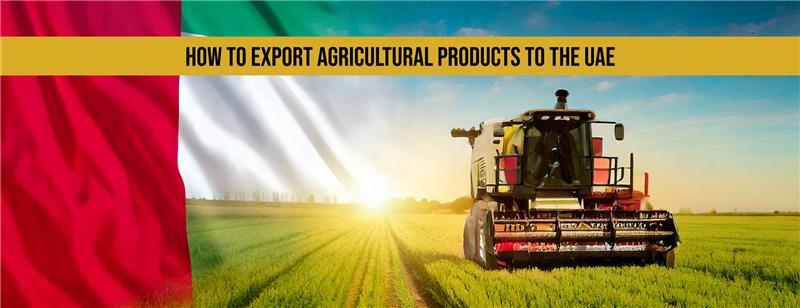
How To Export Agricultural Products To The UAE
The United Arab Emirates is more than just a land of towering skyscrapers & luxury - it’s a booming global trading hub with an ever-growing appetite for agricultural imports. With its rapidly growing population and a high reliance on imports, it’s no wonder that agriculture exporters across the globe are looking to tap into this lucrative market.Curious to learn how to make your mark and position yourself as a key player in this industry? Read on to explore how to export agricultural products to the UAE.
Understanding The UAE’s Agriculture Market
The UAE’s agricultural import market is indeed filled with a plethora of opportunities. With its limited arable land and desert conditions, it’s without a doubt that the nation relies heavily on imports from around the globe to meet its agricultural and food needs. From aromatic spices, tropical fruits to fresh vegetables and grains, the list of agricultural products exported to the UAE is indeed vast.
What’s more is that the strategic location of the UAE amplifies the nation as a pivotal re-export hub from the MENA region. With all this in play, agri exporters can not only target local consumers, but also have access to doors to a wider range of regional markets, especially in Africa & the Middle East, increasing its reach and profitability exponentially.
How To Export Agricultural Products To The UAE?
Exporting agricultural products to the UAE is a multi-faceted process that requires a strategic approach. Here’s a step-by-step guide to help you successfully enter this lucrative market.
1. Decoding UAE’s Consumer Preferences
For starters, you need to understand the diverse tastes and preferences of the UAE market and its consumers. As the Emirati nation is quite the melting pot of cultures, it’s critical to research the market thoroughly to understand what’s in demand and what’s not.
For instance, certain agricultural products like fresh vegetables, fruits, spices and grains are in demand all year long. But, those belonging to certain niche categories like halal-certified foods and organic produce are growing at the same momentum in today’s market.
Therefore, it’s essential to understand the changing consumer preferences and seasonal trends to give your agricultural export business the competitive edge it needs to propel forward.
2. Navigating The UAE’s Trade Laws
Once you’ve done a solid background check on the UAE agriculture market, and you’re sure to get into this industry, the next step for you is to comply with the rules and regulations of the UAE food industry. To ensure food quality & safety, the Emirati nation has set stringent food safety standards, managed by the Ministry of Climate Change & Environment (MOCCAE).
What’s more is that agricultural exporters from across the globe must obtain several certifications depending on the nature of the products to be exported to the nation.
Plus, you should also label your products clearly to meet the UAE’s food labeling regulations. In other words, every agri export product should have a legible label that states its ingredients, production & expiration dates, country of origin, and more, both in English and Arabic.
3. Finding The Right Export Partner
While the UAE market is well-connected due to its strategic location, partnering with an authentic & experienced local distributor can significantly ease your entry.
What’s more is that by establishing a solid rapport with such a network, you can navigate custom regulations and markets with ease, while at the same time, connect with key buyers for your agricultural export business.
Not to mention, local distributors have an upper hand with distribution and warehousing, giving you an edge for your products to reach the right people at the right time.
And the benefits don’t end there. Establishing a sound relationship with local distributors can give you access to various free trade zones, allowing you to leverage tax exemptions and logistics.
4. Simplifying The Logistics of UAE Agriculture Trade
Efficient logistics are the backbone of exporting agricultural products to the UAE. In fact, one of the biggest concerns for agricultural exporters is the shelf life of their products. Produce like fresh fruits and vegetables are perishable, and retaining their freshness & quality throughout the entire supply chain is indeed a top priority for exporters.
Thankfully, the UAE’s advanced logistics infrastructure serves as an excellent support for global agri export-import, especially with its state-of-the-art cold chains, refrigerated transportation, and specialized storage facilities.
However, logistics isn’t just about mere infrastructure - it’s also about the right strategy. Agriculture exporters often encounter a trade-off between speed and cost. While air freight is relatively faster for high-value products, sea freight is much more cost-effective.
Therefore, when exporting agricultural products to the UAE, it’s essential to weigh out your options between different modes of transportation to see which is the most feasible for your business.
5. Getting Your Paperwork In Shape
Lastly, getting your documents in shape for exporting agriculture products is indeed non-negotiable. From halal certificates, detailed labels, ISO & HACCP quality certificates to commercial invoices & packing lists, every piece of paperwork must meet the stringent Emirati standards. Incorrect or missing documents can lead to unexpected costs, shipment delays or even outright rejection at customs.
The Way Forward
On the whole, breaking into the UAE’s agricultural export market may seem like a long trek through the desert, but with the right preparation, it can be a smooth road ahead.
From understanding the kaleidoscope of consumer preferences to forming strong local partnerships, every step is a milestone for success. What’s more important is that the UAE isn’t just a market - it’s a gateway for global opportunities. With its appetite for quality agricultural products and world-class infrastructure, the Emirati nation offers fertile ground for your agriculture export business to thrive.
So, get ready to roll up your sleeves, cross-check your paperwork, and start planting the seeds of success. The harvest? A booming agriculture export business rooted firmly in one of the world’s top lucrative markets.
Frequently Asked Questions (FAQs)
1. Does the UAE import fruits?
Absolutely! The UAE imports an array of fruits from several agri-exporters across the globe. In fact, its main fruit import partners are Saudi Arabia, India, Kenya, Pakistan and Philippines.
2. Where does the UAE import vegetables from?
The UAE imports vegetables from several countries including from India, Iran, Turkey, Egypt and China to name a few.
3. How can I export fruit from India to the UAE?
If you are an agriculture exporter looking to export fruits to the UAE, you need to first get your paperwork in shape, from certifications to licenses, target pivotal buyers for your products, and ensure proper labeling, packaging and compliance with the import regulations of the UAE.




